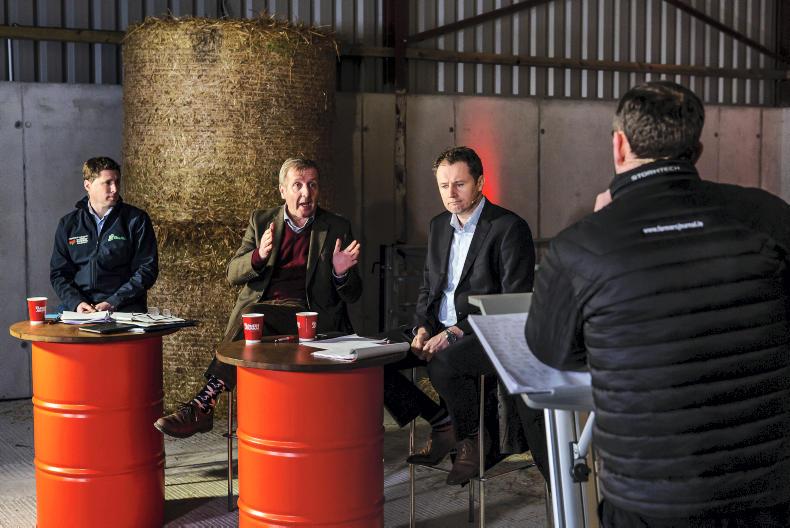Sinn Féin has been the big winner of the election. The party will now lead the discussions around the formation of the next government.
While those discussions will be initially with the other parties of the left, the numbers mean forming a government will probably require the involvement of two out of Sinn Féin, Fianna Fáil and Fine Gael. It’s otherwise hard to get to the magic number of 80 Dáil seats.
Let’s rank the possibilities in order of likelihood.
Shades of green - Fianna Fáil/Sinn Féin/Green Party
Pros: This has the numbers, with a combined 85 TDs giving a decent working majority. There are areas of policy compatibility.
Cons: Who will be Taoiseach? Micheál Martin has an extra TD, but Mary Lou McDonald’s party received an extra 50,000 votes - 10% more than Fianna Fáil. The first byelection could see Sinn Féin become the largest party. Rotation may be on the table here. And will the Green Party want too much of their policy platform for the liking of the other prospective partners?
The civil partnership - Fianna Fáil/Fine Gael/Independents
Pros: Fianna Fáil and Fine Gael have shown they can work in a confidence and supply arrangement, so coalition would be possible. There are a dozen “gene pool” independent TDs who could provide the numbers to allow stable government.
Cons: Both parties fear a Sinn Féin-led opposition would lead to further losses to Mary Lou McDonald’s party at the next election. Fine Gael seems to think it needs time to regroup in opposition. Fianna Fáil would demand the Taoiseach’s job, no rotation.
Red and redder - Sinn Féin/Green Party/Labour/SDP/Solidarity-PBP/Aontu/I4change/Left Independents.
Pros: If the people voted for change, then this would definitely be change – a government of basically everybody except Fianna Fáil, Fine Gael, and the Healy-Raes.
Cons: The maths are difficult. There are only 85 TDs when you take FF and FG out of the equation, and quite a few independents are right of centre. Farmers would be fearful of the attitude of such a government to the sector.
Next Minister for Agriculture
The other big question is who will succeed Michael Creed as Minister for Agriculture. A Fianna Fáil minister might offer more continuity in policy terms and Charlie McConalogue would love the job.
However, there could be an attraction in a Sinn Féin TD such as Matt Carthy or Martin Kenny becoming Minister for Agriculture.
For Sinn Féin, it would offer a chance to deepen its rural base. For Fianna Fáil, it would avoid alienating more intensive farmers. This would be particularly true with the Green Party in coalition, and holding the environment portfolio.
And how about an independent minister? Michael Fitzmaurice, anybody?
Sinn Féin has been the big winner of the election. The party will now lead the discussions around the formation of the next government.
While those discussions will be initially with the other parties of the left, the numbers mean forming a government will probably require the involvement of two out of Sinn Féin, Fianna Fáil and Fine Gael. It’s otherwise hard to get to the magic number of 80 Dáil seats.
Let’s rank the possibilities in order of likelihood.
Shades of green - Fianna Fáil/Sinn Féin/Green Party
Pros: This has the numbers, with a combined 85 TDs giving a decent working majority. There are areas of policy compatibility.
Cons: Who will be Taoiseach? Micheál Martin has an extra TD, but Mary Lou McDonald’s party received an extra 50,000 votes - 10% more than Fianna Fáil. The first byelection could see Sinn Féin become the largest party. Rotation may be on the table here. And will the Green Party want too much of their policy platform for the liking of the other prospective partners?
The civil partnership - Fianna Fáil/Fine Gael/Independents
Pros: Fianna Fáil and Fine Gael have shown they can work in a confidence and supply arrangement, so coalition would be possible. There are a dozen “gene pool” independent TDs who could provide the numbers to allow stable government.
Cons: Both parties fear a Sinn Féin-led opposition would lead to further losses to Mary Lou McDonald’s party at the next election. Fine Gael seems to think it needs time to regroup in opposition. Fianna Fáil would demand the Taoiseach’s job, no rotation.
Red and redder - Sinn Féin/Green Party/Labour/SDP/Solidarity-PBP/Aontu/I4change/Left Independents.
Pros: If the people voted for change, then this would definitely be change – a government of basically everybody except Fianna Fáil, Fine Gael, and the Healy-Raes.
Cons: The maths are difficult. There are only 85 TDs when you take FF and FG out of the equation, and quite a few independents are right of centre. Farmers would be fearful of the attitude of such a government to the sector.
Next Minister for Agriculture
The other big question is who will succeed Michael Creed as Minister for Agriculture. A Fianna Fáil minister might offer more continuity in policy terms and Charlie McConalogue would love the job.
However, there could be an attraction in a Sinn Féin TD such as Matt Carthy or Martin Kenny becoming Minister for Agriculture.
For Sinn Féin, it would offer a chance to deepen its rural base. For Fianna Fáil, it would avoid alienating more intensive farmers. This would be particularly true with the Green Party in coalition, and holding the environment portfolio.
And how about an independent minister? Michael Fitzmaurice, anybody?






 This is a subscriber-only article
This is a subscriber-only article










SHARING OPTIONS: